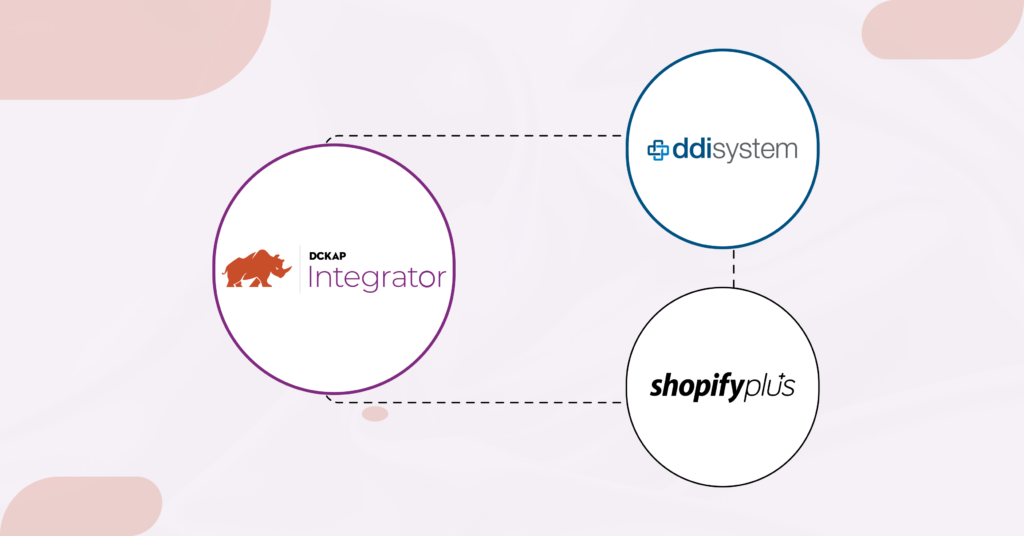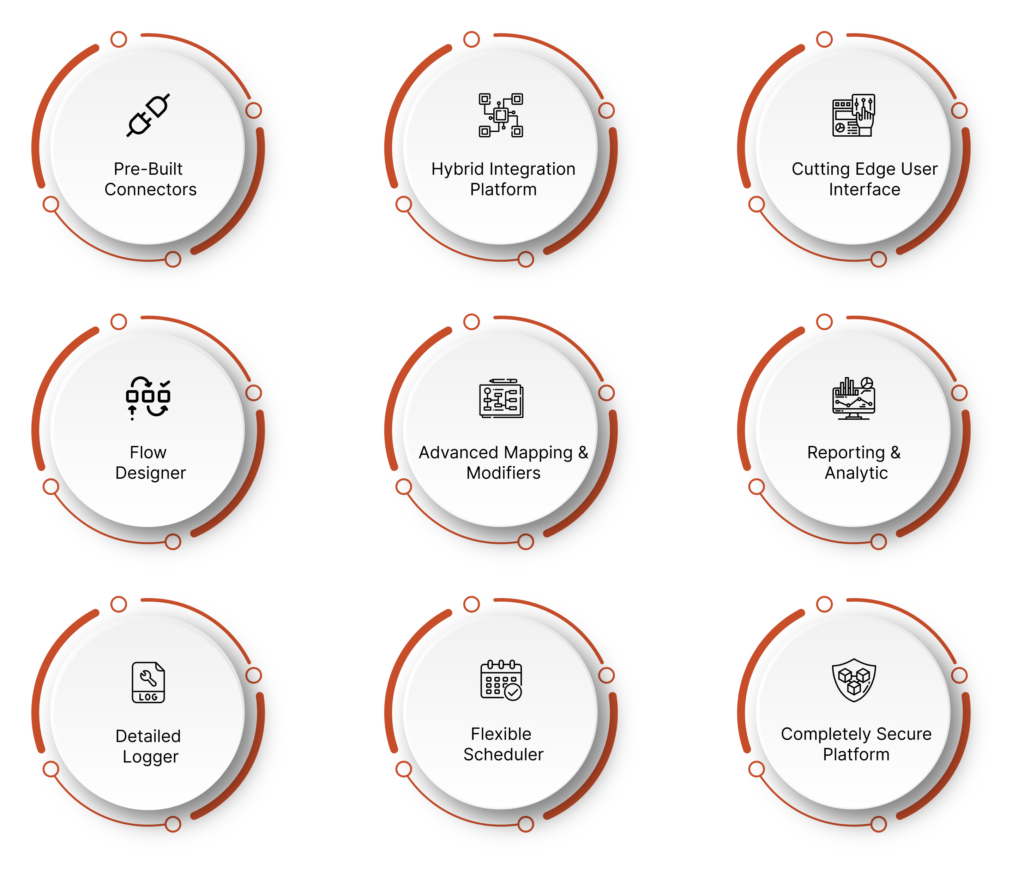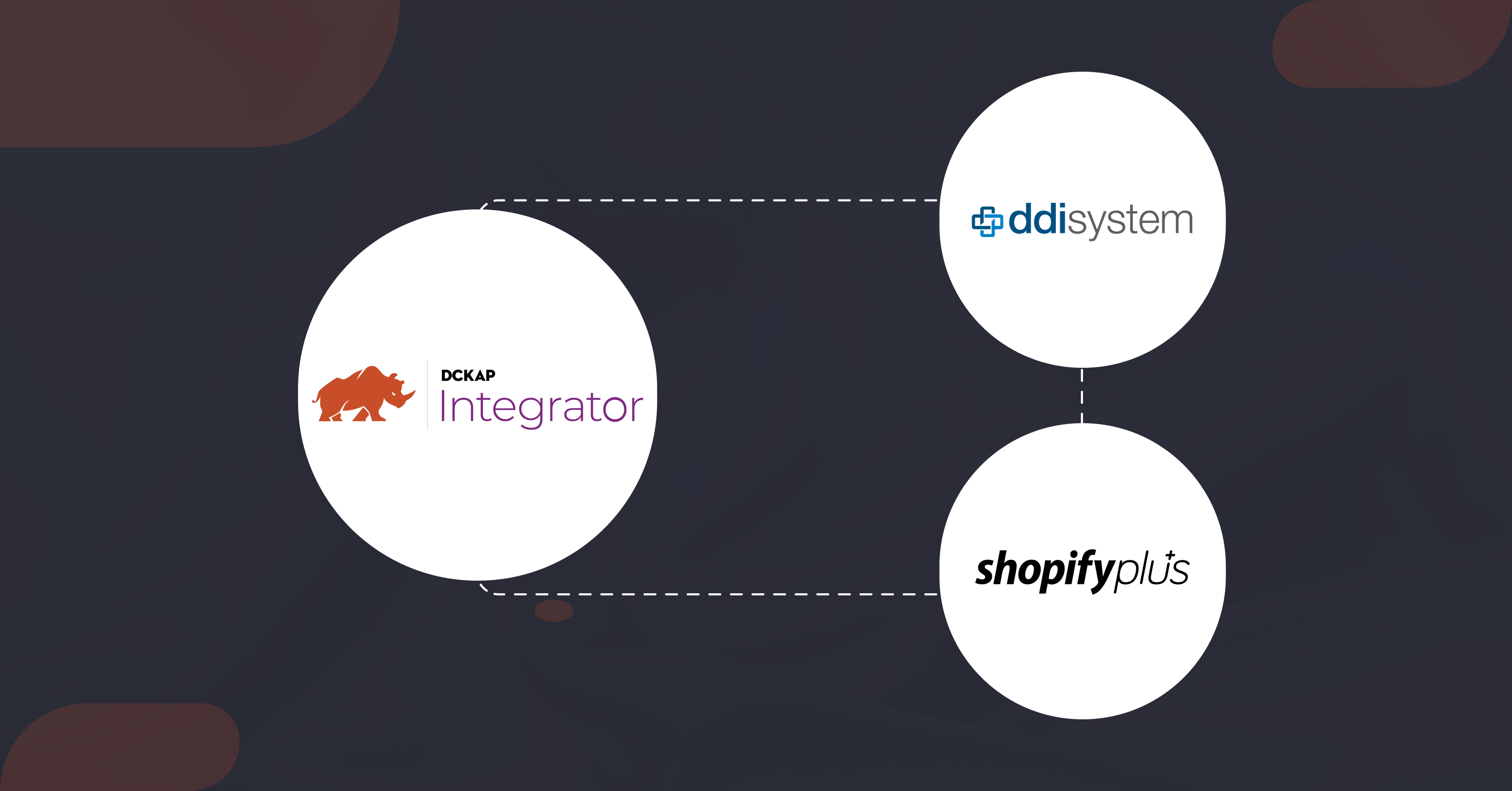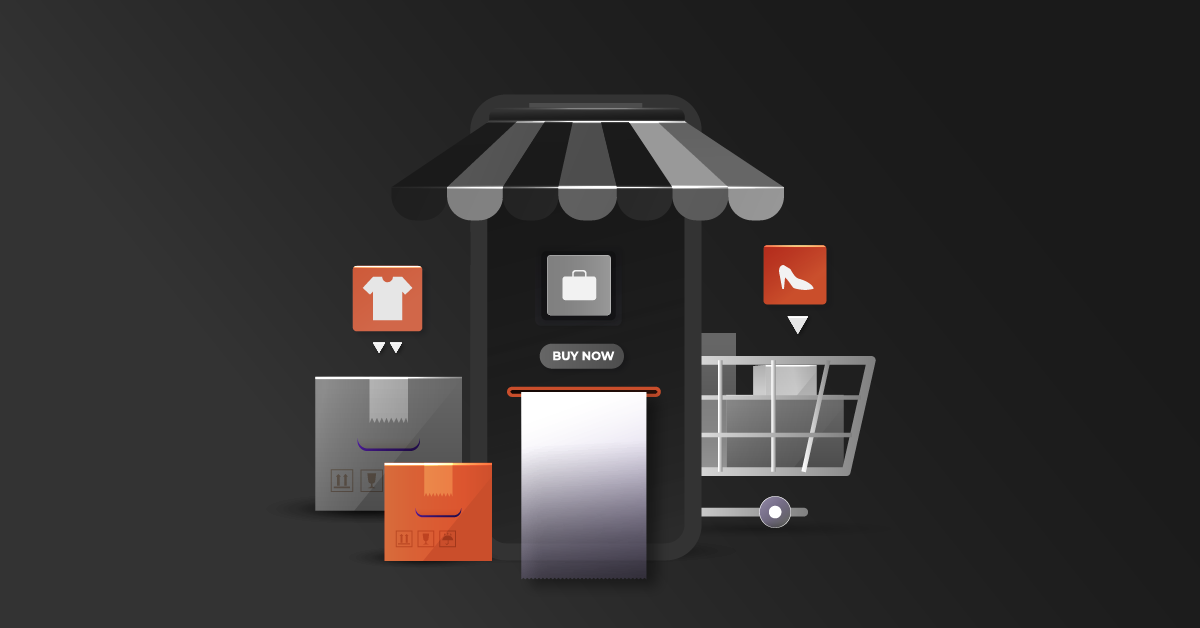Businesses have to stay in touch with the changing times. One of the most effective ways of doing this is by embracing technological development. B2B enterprises are no different. A successful enterprise is one that is constantly on its toes looking for ways to improve its operations and increase sales.
However, a lot of companies end up getting bogged down by the process of maintaining multiple channels and business applications. Maintaining your storefront by integrating ERP and eCommerce is the first thing you need to do.
That’s why we have come up with the guide to help you identify the possibility of Shopify Plus & DDI system Integration and solution that can help you streamline integration with zero hassles. Shopify Plus & DDI System Integration is an important part of your business. It bridges the gap between your website, Shopify Storefront and Merchant Services by giving you full control over everything that happens on your storefront.
Scroll down to read more!

Contents
Why Shopify Plus for B2B eCommerce?
Shopify Plus is the world’s leading eCommerce platform, Businesses like Shopify because it is simple to manage several eCommerce sites with just one Shopify B2B website or by working with a Shopify B2B web development agency. By giving effective SEO for Shopify wholesale tactics and tools, it offers merchants the foundation for a successful eCommerce marketing strategy.
Shopify is also a highly scalable program that can scale with you no matter how many transactions you have. The servers and checkout can handle a lot of traffic and transactions without any problems. Shopify is also well-known for its extensive app store and ease of interaction with other platforms. Shopify has vetted and tested over 1500 applications in the marketplace, so you can trust them to make operating your online businesses easier.
Read More: Everything you need to know about Shopify Plus partners
Is DDI System a Better ERP Suite For You?
DDI’s software solutions are designed with usability in mind, focusing on achieving seamless end-to-end integration and transforming data into actionable insights that can facilitate more effective organizational decision-making. Together, these two platforms provide businesses with everything they need to manage their operations effectively.
DDI System provides all of the necessary functions, including order fulfillment, demand forecasting, strategic pricing, and more. The DDI System is ideal for many sectors, offering ERP solutions like the supply of industrial and safety equipment (HVAC, Electrical and lighting, Bearing and fastener, Supply of construction equipment, Irrigation supply).
Relevant Reading: Five Reasons Why DDI System Provides The Perfect ERP Solution
A Guide to Shopify Plus & DDI System Integration
By connecting an eCommerce application to an ERP, distributors, manufacturers, and retailers may build bidirectional information flows between the two systems, requiring them to only enter data into one system.
The Shopify Plus & DDI System Integration gives businesses a single view of their data, making it easy to track inventory levels, customers, orders, and more. This integrated system also makes it easier to automate tasks and processes, saving businesses time and money.
Overall, the Shopify ecommerce & DDI System integration provides businesses with a powerful tool for managing their operations. If you’re looking for a way to streamline your business, this is the solution for you.
Shopify Plus & DDI System Integration: Why You Should Integrate?
Shopify Plus is a powerful eCommerce platform that enables businesses to sell online. A key feature of Shopify Plus is its ability to integrate with various third-party applications and systems. One such system is the DDI System. The DDI System is a powerful inventory management tool that helps businesses keep track of their stock levels, sales, and orders. integrating the DDI System with Shopify Plus can help businesses streamline their operations and improve their efficiency.
There are many benefits of integrating the DDI System with Shopify Plus. Here are some of the most important ones:
Improved accuracy of stock levels
The DDI System is designed to provide accurate real-time data on stock levels. This information can be used to ensure that businesses always have the right amount of stock on hand, which can avoid overstocking or stock outs.

Better order tracking
The DDI System can also help businesses track their orders more effectively. This information can be used to monitor order fulfillment rates and identify any potential problems.
Increased efficiency
Integrating the DDI System with Shopify Plus can help businesses automate manual data inputs and reporting.
What Happens If You Miss Out On ERP & eCommerce Integration
If your business is not able to integrate with ERP software or eCommerce platforms, then it will be difficult for you to run effectively. In order to ensure that you are able to stay ahead of the competition, you should make sure that you have a solid ERP and eCommerce integration solution such as Shopify Plus Hubspot integration solutions in place.
Data silos will hinder consistency & efficiency
Information exchange and collaboration across departments will be hampered by siloed data. Data quality is frequently harmed as a result of discrepancies in data that may overlap across silos. It’s also difficult for leaders to acquire a comprehensive perspective of enterprise data when data is fragmented across your business applications.
Lack of visibility will spoil your business reputation
The absence of data integrations brings visibility issues across your business. Data that is difficult to obtain and utilize in a timely manner, or that cannot be trusted once found won’t provide value to making decisions. As a result, your business will fail to reach the market and your competitors will benefit from it.
Loss of valuable customers
Today’s customers expect fast delivery of products and services. If you fail to integrate your eCommerce platform and your ERP, you will fail to give your customers a unified experience across omnichannel. This will lead to losing customers.
Missing out on ERP & eCommerce integration can have a significant impact on the business. Here are some of the consequences:
Higher costs & lower productivity
Not having a proper data integration process will mean that your business will have to pay more for any services that you need to run.
Moreover, in many businesses, employees are busy with their day-to-day duties and they don’t have time to spend on integrating systems. This leads to lower productivity levels.
Recommended Reading: Integrated Channels for Client Acquisition: How ERP Integration Amplifies Omnichannel Experience
The Challenges in Integrating DDI System & Shopify Plus
The requirement for eCommerce integration brings the inherent difficulty of bridging the ERP and the eCommerce platform. A good ERP integration solution will help your business run at peak performance levels by providing a number of benefits such as:
- Proactive monitoring of various data points
- Allowing for real-time decision making
- Streamlining processes that are manual
One of the challenges you might face is Security issues. The most important company data, such as sensitive customer information and proprietary intelligence, are stored in your ERP system. At all costs, they must be protected. When malicious hackers target ERP software, increasing the complexity of your system through ERP integration increases the probability of unprotected connections, placing your company in greater danger. To ensure security, you need a GDPR-compliant platform that helps systems communicate with the utmost security with encrypted transactions.
In a nutshell, developing a functional pathway necessitates technological capabilities that go beyond what a legacy solution can provide is necessary to ensure bi-directional data sync coupled with real-time customer engagement.
Similar Reading: Struggles without ERP Integration [Explained A-Z]
Shopify Plus & DDI System Integration Using DCKAP Integrator
DCKAP Integrator, a no-code cloud-based integration platform, is a fully-serviced iPaaS that helps you with Shopify Plus & DDI System integration without writing any code. With a user-friendly interface, you can monitor, manage, and alter your connection, giving you total control over your data and complete performance insights.
Let’s dive through some of the important data points that can be integrated using DCKAP Integrator:
Customer Orders
Customer happiness hinges on effective order fulfilment. In the sales order processing procedure, having real-time information from several departments is critical. A fully integrated ERP system with built-in sale processing will ensure a smooth transition from initial sale to delivery. When a consumer places an order, all departments are notified so that they may collaborate on the purchase’s fulfilment.

They can follow order progress and arrange their tasks thanks to automation and integration. The sales staff creates the order’s specifics, which are needed in production, packing, and shipping. Finally, just before the order is shipped, an automatic invoice may be prepared that includes taxes and freight costs.
Relevant Reading: Order Management Made Easy With DDI System
Pricing Quotes
Pricing management refers to the capacity to control product pricing in an ERP system. Because most B2B transactions are based on negotiated pricing, both systems must employ the right prices and rules. You have the option of tailoring your answer to various consumers. In B2B, for example, if customer number one has negotiated prices but client number two, a new customer, does not, you may provide the appropriate information to the eCommerce platform based on user demography and requirements.
Real-Time Inventory Data
Keeping precise stock levels and controlling stock across several channels can have an influence not just on how quickly orders are filled and transported, but also on other parts of your business including operations and finances. To limit the margin of error and enhance efficiency, many eCommerce organizations prefer to use an ERP integration solution. By integrating your client order data on ERP to ERP using DCKAP integrator, you may efficiently manage the order fulfilment process.
Real-Time Reports
The ERP system generates a variety of financial reports. And sales reports are generated by the eCommerce site. You can simply produce critical financial documents including cash flow, trial balance, profit and loss statement, and balance sheet by integrating ERP and your internet site. These records are crucial in providing clarity to your financial data.
Financial Data
When a sale from your Shopify eCommerce site is entered into your ERP system, it appears in the sales order right away and is filled across your financial accounts. The payment is counted as revenue as soon as it is received. Your money, inventories, customers, and sales are all audited by an ERP system. The eCommerce system becomes an extension of the auditing system when you integrate your Shopify Plus eCommerce platform with DDI’S Infor ERP.

Customer Data
All data, including customer information, orders, payments, and shipping information, will be exchanged and synced with ERP software via ERP eCommerce integration. Furthermore, product inventory details may be transferred from the ERP to the eCommerce platform, removing the need for re-entry. As a result, the integration decreases human participation, data redundancy, and inaccuracies that might arise when data is sent manually.
Why DCKAP Integrator?
Enterprise-focused DCKAP Integrator (previously Cloras) is a distributor-friendly middleware system that handles all data flow and data transfer between two or more data points (CRM, ERP, and so on). Using DCKAP Integrator, you don’t need any specific coding skills to link your web application with a third-party service.
Let’s have a look at some of the specialized features in DCKAP Integrator that helps to integrate DDI’s ERP & Shopify Plus:

Ease Shopify Plus & DDI System Integration Using DCKAP Integrator
With the growing popularity of B2B integration partners, there has emerged a dilemma among companies that struggle with deciding if outsourcing data integration is a strategic option for them and what they should look out for when choosing their integration vendor. There is no one-size fit solution for this. It is all about identifying your integration requirements and getting an integration provider that can customize solutions for you.
Experience the hassle-free Shopify Plus & DDI System integration services that DCKAP offers as the technology partner of the DDI system, ushering in hassle-free operations and strengthening your specialty in a rapidly globalized arena of digital commerce. To learn more, get in contact with our team of specialists.




